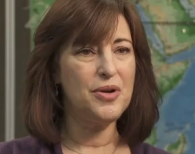Hispanic Heritage Month, which runs until Oct. 15, is an opportunity to reflect on the contributions of new Americans. In this short video, high school students in Los Angeles embark on a project to help change the perception of new immigrants in their community.
In their campaign “Don’t drop the I-bomb” they hope to remove the negative connotation of the word “illegal” and create a more equal and welcoming atmosphere for everyone.
Discuss:
What particular actions of the students do you believe were the most effective?
Do you think the actions of these students will create a more positive view of immigrants in their community? Why or why not?
What are other ways people can work together to create a more positive atmosphere for recent immigrants?
This video features Facing History and Ourselves teachers at Animo Jackie Robinson High School.
Facing History

Julie Mann leads a human rights class at Newcomers High School in New York, which has recently been focusing on thetreatment of local immigrants.
My name is Julie Mann and I’m an ESL and Human Rights teacher at Newcomers High School. About 17 years ago, I started a special human rights class at Newcomers.
In recent years, my human rights class has focused on immigration and anti-immigrant sentiments and actions, very locally in New York. More specifically, we started thinking and learning about treatment of immigrants on Long Island, first through the film Farmingville and then through the murder of Marcelo Lucero. When that horrific event occurred, my students and I felt we had to do something.
To help change negative perceptions of immigrants, we decided to teach others their stories. I truly believe that most hate crimes occur out of ignorance and fear of the unknown. I felt that if people got to know my students, they would have to love them! Last year, we created the Building Bridges project, because I felt it would help build a bridge between immigrants and those who feared them.

"By the end of the year, the whole school was really pumped. One of the social workers in the school asked every club to take a section of the school and make it their anti-bullying zone. So the football team right away took the locker room, and the spirit club took the hallways, and so on."
Gail Price, Orange High School teacher
Last year, our filmmakers documented anti-bullying efforts in Gail Price's classroom in the short film, "Students Map Bully Zones to Create a Safer School." Price is a Facing History teacher at Orange High School in Pepper Pike, OH.

By Adam Strom, Director of Research and Development, Facing History and Ourselves
Full article originally published on Facing History and Ourselves

Patrice’s presentation highlighted excerpts of The Working Group’s films that have inspired communities around the country to respond to hate crimes in meaningful and constructive ways.
In February, Executive Producer Patrice O’Neill led a conversation on “Film as a Tool For Social Change” at the Boston Public Library as part of Facing History and Ourselves‘ Choosing to Participate exhibit. Choosing to Participate is an interactive multimedia exhibition that tackles issues such as violence, racism and hate crimes while profiling the compelling stories of individuals and communities who have confronted these challenges and had to make choices.
